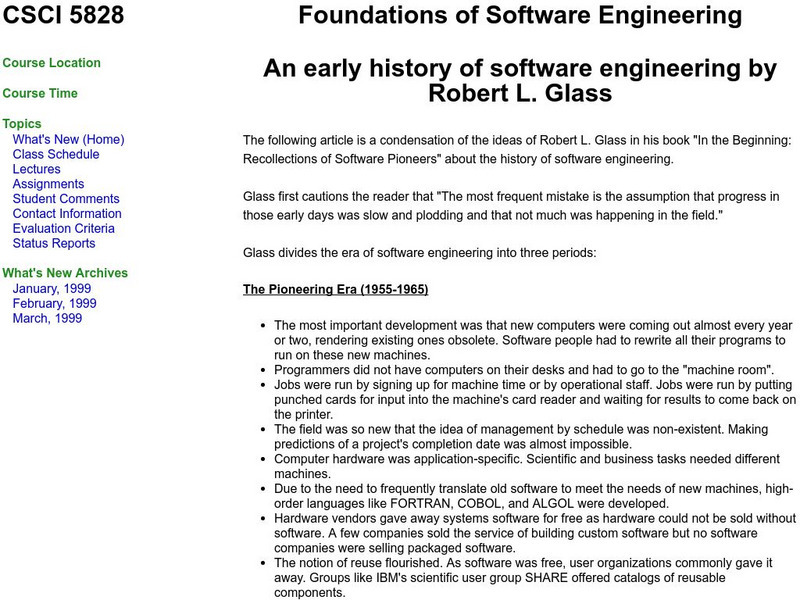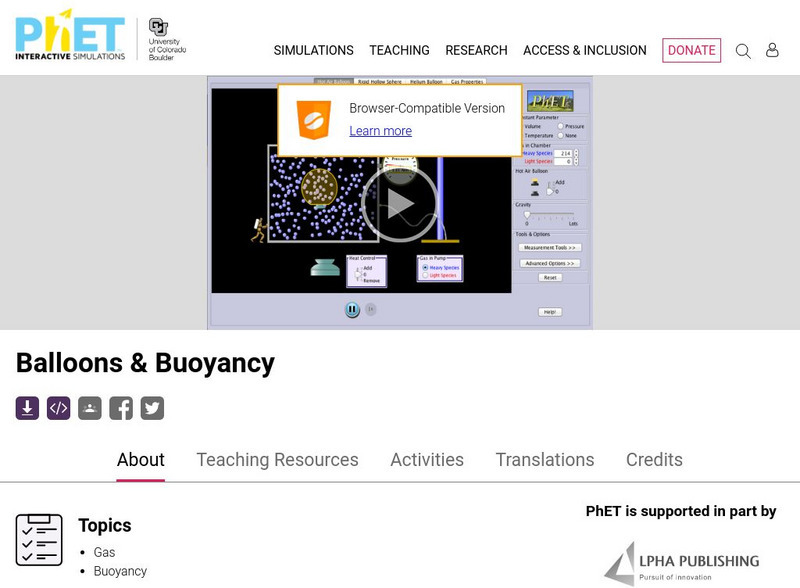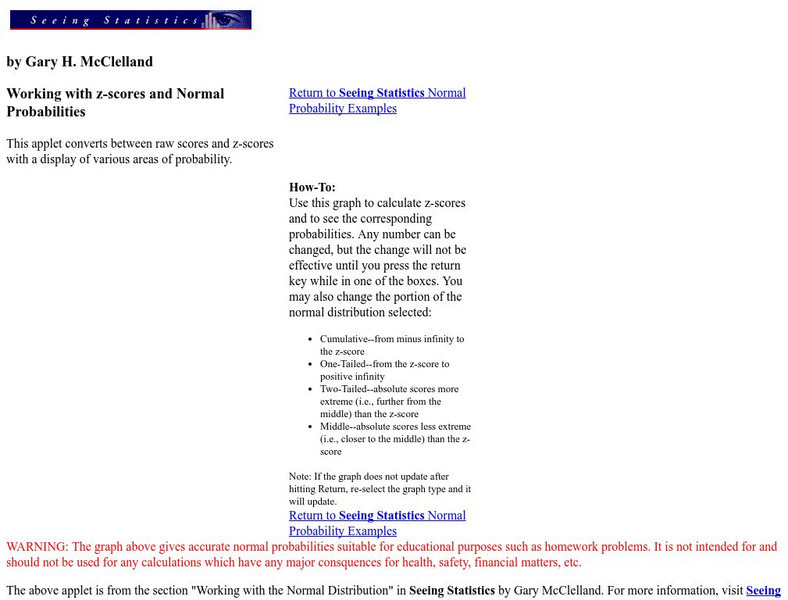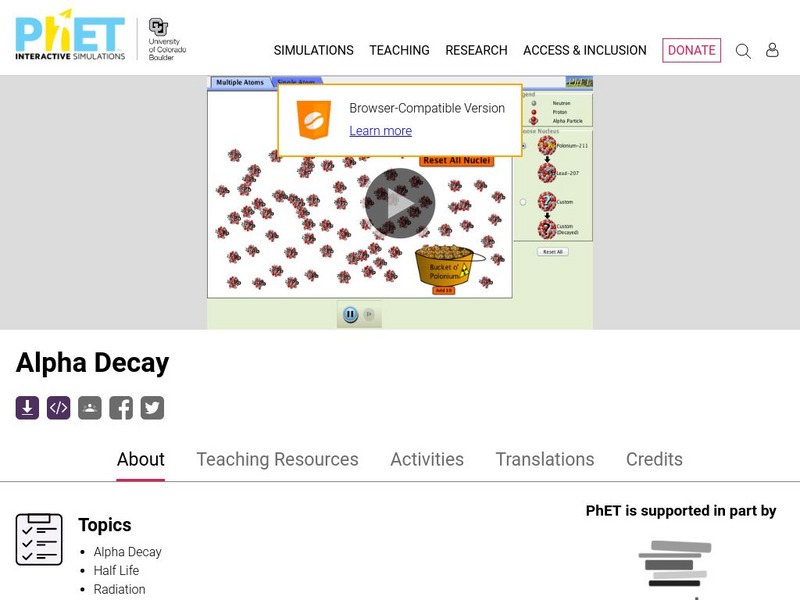University of Colorado
University of Colorado: Exponential, Trigonometric and Hyperbolic Functions
This site explains the Exponential, Trigonometric and Hyperbolic functions
University of Colorado
University of Colorado: Academic Integrity Seminar: Frontier and American Character
This website is the reproduction of Ray Allen Billington's essay, "How the Frontier Shaped the American Character," (published in "American Heritage, The Magazine of History" in 1958). Billington analyzes the Turner frontier thesis in...
University of Colorado
University of Colorado: Heritability
This site from the University of Colorado at Boulder provides two good definitions for heritablitity. It also provides a short list of the "five important attributes about estimates of heritability and environmentability." The site also...
University of Colorado
University of Colorado: Cassini Uvis Ultraviolet Imaging Spectrograph
This is the home page of the team that built the Ultraviolet Imaging Spectrograph carried by the Cassini mission to Saturn.
University of Colorado
University of Colorado: Foundations of Software Engineering: An Early History
Provides an early history of software engineering, dividing software engineering into three periods: the Pioneering Era (1955-1965), the Stabilizing Era (1965-1980), and the Micro Era (1980-Present).
University of Colorado
University of Colorado: Ph Et Interactive Simulations: Balloons & Buoyancy
Students studying buoyancy will better understand its concepts with this virtual experiment using various balloons and testing what makes them float or sink.
University of Colorado
University of Colorado: Problems on Scientific Notation
Scientific notation is reviewed through these problems that include solutions. Concepts covered are converting, division, multiplication, and significant digits.
University of Colorado
University of Colorado: Z Scores Applet
The Applet assists the user in questions which specify a probability and ask for the relevant range of raw scores or z scores. The program will also transform from raw to z scores and back again, if needed.
University of Colorado
University of Colorado: Normal Probabilities Applet #3
The Applet illustrates how to use the old-fashioned tables of normal probabilities and areas under the normal distribution cureve to arrive at corresponding graphs of the areas. A good resource for the topic.
University of Colorado
University of Colorado: Ph Et Interactive Simulations: Alpha Decay
Via this interactive SIMS experiment, students will grasp better understanding of decay in alpha particles and their relationship to half life. Lessons and teacher tips included.
University of Colorado
University of Colorado: Ph Et Interactive Simulations: Radio Waves & Electromagnetic Fields
Manually or computer generated, students can test radio waves being transmitted from a virtual radio station to a home. Study the curve, vectors, electric field, and more.
University of Colorado
University of Colorado: Ph Et Interactive Simulations: Battery Voltage
Take a look inside a battery and change the voltage to see what goes on inside. Read the voltmeter as little stick people move the charges from one end of the battery to the other.
University of Colorado
University of Colorado: Physics 2000: Quantum Atom: Angular Momentum of an Electron
A very technical explanation of the angular momentum of an electron.
University of Colorado
University of Colorado: 9/11/01: Immediate Impacts and Their Ramifications
Comprehensive report of the September 11, 2001, terrorist attacks, the outcomes, role of media, and impact on federal emergency management.
University of Colorado
University of Colorado: Physics 2000: Balmer's Formula
A short description of a physics lab involving the determination of the wavelength of the four spectral lines in the hydrogen emission spectrum. Perhaps the most important part of the page is the picture of the spectrometer.
University of Colorado
University of Colorado: Physics 2000: Energy Levels
This site describes the energy levels of atoms.
University of Colorado
University of Colorado: Physics 2000: Temperature and Absolute Zero
A thorough, multipage discussion of color and color television sets that explains how an image is formed on the television using red, green, and blue light. Understandable discussion, excellent graphics, and many interactive Java applets.
University of Colorado
University of Colorado: Physics 2000: Beta Decay
An interactive turtorial on beta decay. Very readable and has a little extra for the advanced student.
University of Colorado
University of Colorado: Physics 2000: Einstein's Legacy: Microwave Ovens
A series of pages that explain how microwave radiation is utilized by ovens to cook food. Includes several Java applets.
University of Colorado
University of Colorado: Physics 2000: Electromagnetic Waves
An excellent site with several pages describing what electromagnetic radiation is.
University of Colorado
University of Colorado: Physics 2000: The Big Picture
Ever wondered how your TV produces those images on the screen? You can use the explanations and the interactive applets on these pages to find out how a cathode ray tube allows you to watch your favorite show!
University of Colorado
University of Colorado: Physics 2000: Lasers
If you want to know how atoms and photons work together to make lasers this site has great explanations. There are interactive applets to help you really understand the concepts!
University of Colorado
University of Colorado: Physics 2000: Halflife
An interactive tutorial on half life. Very readable and has a little extra for the advanced student.
University of Colorado
University of Colorado: Physics 2000: Positrons, Alpha Particles, Gamma Rays
An interactive tutorial on positrons. Very readible and has a little extra for the advanced student.












